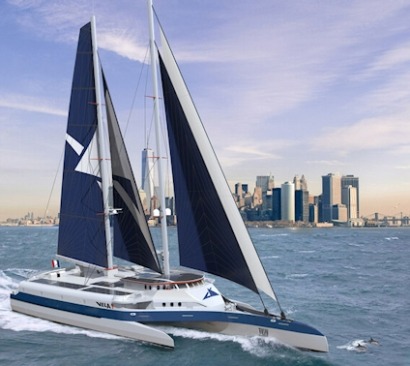
Reducing the environmental footprint of Maritime Transport
By adopting the innovative trimaran concept for its cargo ship, VELA meets several criteria for reducing the environmental impact of maritime transport, which currently accounts for 3% of global greenhouse gas emissions (a figure projected to rise to 17% by 2050 if no action is taken).
Extensive analysis by the VELA team led to the impressive claim of a 99% reduction in greenhouse gas emissions in propulsion compared to conventional container ships. The choice of a trimaran design also enhances stability and ensures the safety of the cargo, while providing a comfortable experience for the sailors on board.
Additionally, by harnessing the abundant wind resources of the ocean and not having to take fuel costs into account, VELA is able to provide high transportation capacity at a fixed and fair price, accommodating up to 450 U.S. pallets (equivalent to 51 TEU containers or 560 EU pallets).
Beyond the elimination of greenhouse gasses during the voyage, VELA also has a lesser environmental impact than other cargo ships by being built with recycled aluminum with interiors made from bio-sourced and geo-sourced materials. All components of the ship have also been designed to be dismantled for reuse on other VELA ships or for other purposes.
Fleet ambitions: 30 boats by 2035
The first VELA trimaran cargo vessel is expected to make its maiden voyage mid-2025, sailing the transatlantic route between Europe and the United States. VELA guarantees fast, reliable and secure transportation, with a warehouse-to-warehouse timeframe of 10-15 days, including loading, transit and unloading, which places it in between conventional air and sea freight.
Furthermore, VELA's efficient routing system ensures that the most optimized route is selected based on weather conditions, with an estimated time of arrival by the hour provided up to four days in advance.
While the choice of propulsion plays a critical role in decarbonizing maritime transport, VELA recognizes that sustainability also depends on pre- and post-transport logistics. The exceptional maneuverability of the VELA Trimaran Cargo vessel allows access to secondary ports, facilitating closer proximity to customers' factories and warehouses.
"Choosing the France-USA seaway was a no-brainer. The United States is the second largest export destination for French luxury products. Moreover, the wind is plentiful and predictable in the North Atlantic. We are very happy to be able to continue facilitating American and French culture exchange, but in a way that prioritizes the decarbonization of Franco-American trade as well," said Michael Fernandez-Ferri, Cofounder of VELA.
Looking ahead, VELA aims to have a departure from France to the USA and vice versa every nine days by 2028, further solidifying its commitment to sustainable and efficient shipping practices.

